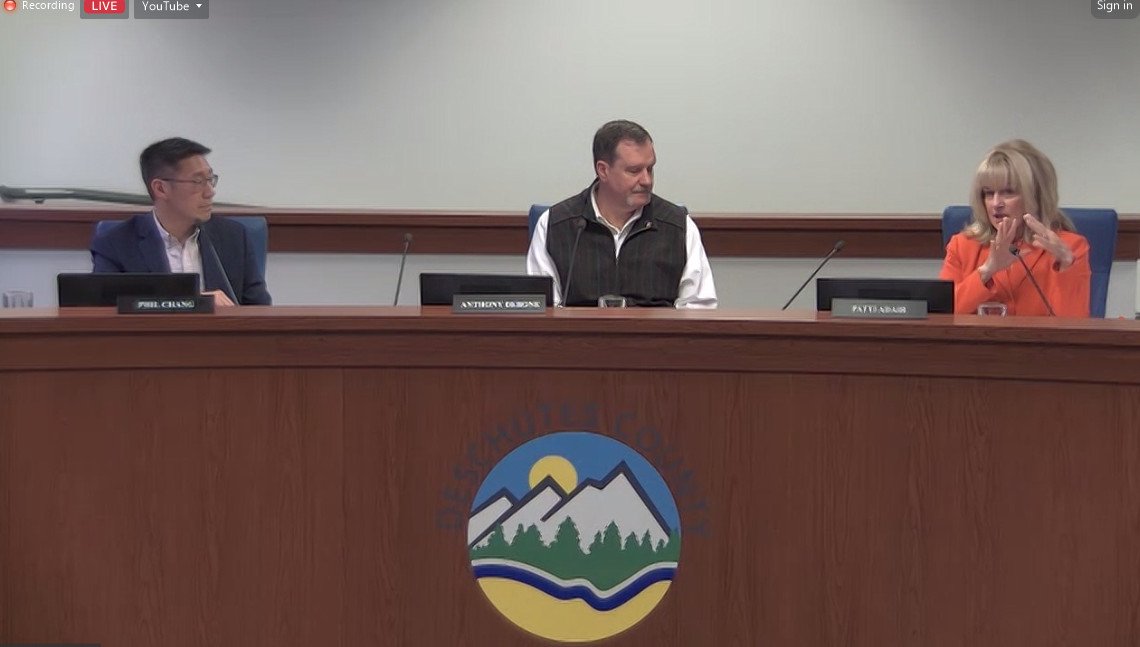Deschutes County commissioners push back new camping rules amid efforts to create managed camps, safe parking

Effective date postponed to March 31; 'collaborative agreement' with other govts. in the works
BEND, Ore. (KTVZ) – Deschutes County commissioners voted 3-0 Wednesday to delay by more than four months the effective date of its new camping regulations for county land as it works with other entities to develop managed camps and safe parking sites where numerous homeless residents on public land could be moved.
The board adopted the ordinance in August, with a Nov. 21 effective date. "However, since the county has yet to locate or develop the necessary parcel(s) to accommodate sufficient numbers of homeless persons from various unsanctioned camps, legal staff advises delaying the effective date of these amendments" to next March 31, the staff's issue summary stated.
It was one of several items on Wednesday's agenda related to ongoing efforts to deal with the homelessness issue, along with more organization work for the Coordinated Houseless Response Office and adoption of a “collaborative agreement” for managed camps that Gov. Tina Kotek and the mayors of Bend and Redmond also will be asked to sign onto.
Commissioner Phil Chang, who objected to earlier versions of the code update as sought by the sheriff’s office, said he believes the ordinance as it stands is “helpful for us, to keep us laser-focused” on establishing more managed, structured and regulated “outdoor shelter opportunities our community needs -- and we need, in order to ask people to leave unauthorized encampments.” The delay to March, he said, is short enough to "maintain our sense of urgency and focus" on the issue.
Commission Chair Tony DeBone said finding a suitable piece of "green space" in the city has been difficult, and with the governor's office opposed to sites mentioned so far outside the urban growth boundary, "We've been in the same place all year."
Colleague Patti Adair noted seeing another new cluster of tends emerge in a triangle of green space along the Bend Parkway and said, “We definitely have a lot of work to do.”
“The really good news,” Adair added, is that as of next month, the city of Bend “will have capacity up to 600 beds” for homeless residents needing a place to stay. She also said she hopes the Bethlehem Inn will be able to reopen its recently closed Redmond shelter – which the county put $900,000 toward -- under a planned new format.
Commissioners also approved a second intergovernmental agreement with the cities of Bend, Redmond, Sisters and La Pine, with bylaws regarding how the Coordinated Houseless Response Office will operate under the auspices of the Central Oregon Intergovernmental Council, in the wake of former Executive Director Cheyenne Purrington’s controversial departure.
Commissioner Tony DeBone said he was “looking forward to turning the corner” on the joint effort to deal with homelessness issues, and Adair called Bend’s 600-bed milestone “incredibly significant.” Chang pointed to progress on capacity, but said more shelters and transitional housing are needed.
The draft collaborative agreement, to outline each government’s roles and responsibilities, was put together by staff in the wake of recent discussions with the governor’s office. It prompted more discussion of the issues, but only a minor change by commissioners.
Deputy County Administrator Erik Kropp noted that commissioners had set aside, though not committed, $2 million in American Rescue Plan Act funds to go toward future projects.
DeBone said the statements in the brief, less than two-page document seemed “safe,” but that much had changed in the past couple of years.
“We’ve got to do something – we’re in the middle of this,” he said. “We really need clarity and leadership from the governor, in partnership from the Legislature. If we’re going to offer a couple of acres in the city, to get people out of Juniper Ridge – they don’t want that.”
That irked Chang, who said “many people are making assumptions” about what the homeless want or don't want. He noted that many people said those the city removed from Hunnell Road wouldn’t want to live in a shelter or managed operation, but that 20 percent of those staying in the new St. Vincent’s Place used to live there.
“Assuming they don’t want to be in a shelter, if it's one that fits them, is not accurate, or helpful,” he told DeBone. “When you say people ‘don’t want that’ – you don’t know that.”
Adair pointed out how many of the homeless have animals, which can be another challenge: “They’ve got their RVs and their pets,” she said, and while many do want to live in safer places, “they have to be safer for the community, too.”
Chang said “the crux of the matter” is that “we have to be open to all kinds of sites. … We don’t need one mega-site. We probably need a lot of sites that are small enough, we don’t have a lot of human chaos.”
While projects already completed or in the works are “making a dent,” Chang said, “We need enough spaces for a good chunk of people, to ask people to leave North Juniper Ridge.”
Adair said she’s “called most all the churches in Bend,” in an effort to expand safe parking sites, as has been done in Redmond, where it’s been “incredibly successful.” Chang noted that several churches have been coordinating such efforts with each other for some time, and told Adair that “peer to peer” contacts may bear more fruit; she agreed.
Chang also requested, and his colleagues agreed to two small “wordsmithing” changes in the last sentence of the first paragraph, to say, "For a variety of reasons, many of these people (cannot or) will not enter the (indoor) shelter system."
Here's the draft as presented by staff:
